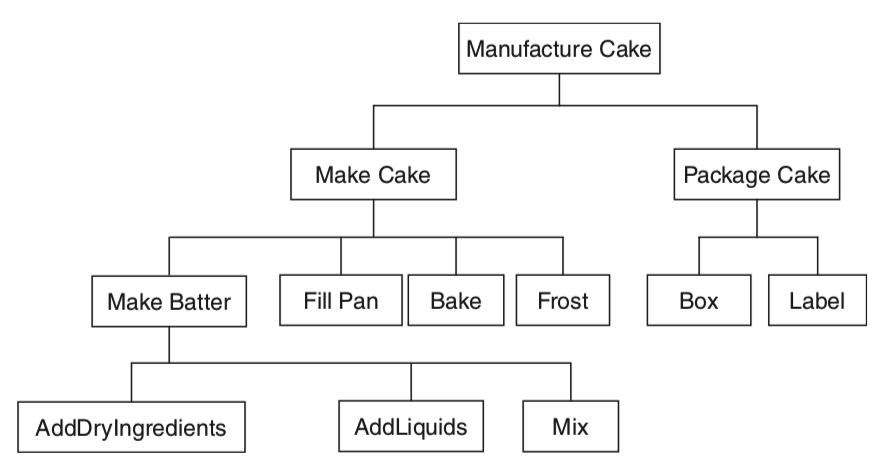Composite design pattern in Ruby组合设计模式
我们在实际项目中经常会遇到层级树状结构的模型, 在实际生活中也经常遇到, 比如公司的部门层级等等, 我们在这里以做蛋糕举例, 我们需要了解到做蛋糕的步骤, 跟踪每一步的时间, 抽象成一张图比较一目了然:

做蛋糕也可以抽象成层级结构, 那么我们按照组合设计模式应该怎么做呢:
-
First, you need a common interface or base class for all of your objects. The GoF call this base class or interface the component
我们需要找到所有节点的共性, 来创建一个基类, 这个基类成为component元件, 在这里, 基类需要初始化做蛋糕各个分解任务的名称, 已经这个任务所需要的时间
class Task attr_reader :name def initialize(name) @name = name end def get_time_required 0.0 end end -
Second, you need one or more leaf classes
我们创建最底层的子节点的类, 继承基类
class AddDryIngredientsTask < Task def initialize super('Add dry ingredients') end def get_time_required 1.0 # 1 minute to add flour and sugar end end class AddLiquidTask < Task def initialize super('Add liquid') end def get_time_required 1.0 end end class MixTask < Task def initialize super('Mix that batter up!') end def get_time_required 3.0 # Mix for 3 minutes end end -
Third, we need at least one higher-level class, which the GoF call the composite class
创建高一级的类, 这个类跟最底层的类就不太一样了
class MakeBatterTask < Task def initialize super('Make batter') @sub_tasks = [] add_sub_task( AddDryIngredientsTask.new ) add_sub_task( AddLiquidsTask.new ) add_sub_task( MixTask.new ) end def add_sub_task(task) @sub_tasks << task end def remove_sub_task(task) @sub_tasks.delete(task) end def get_time_required time=0.0 @sub_tasks.each {|task| time += task.get_time_required} time end end这里我们需要用到策略设计模式, 把添加删除子任务的功能独立出来, 优化如下:
Because we will have a number of composite tasks in our baking example (pack- aging the cake as well as the master task of manufacturing the cake), it makes sense to factor out the details of managing the child tasks into another base class:
class CompositeTask < Task def initialize(name) super(name) @sub_tasks = [] end def add_sub_task(task) @sub_tasks << task end def remove_sub_task(task) @sub_tasks.delete(task) end def get_time_required time=0.0 @sub_tasks.each {|task| time += task.get_time_required} time end endOur MakeBatterTask then reduces to the following code:
class MakeBatterTask < CompositeTask def initialize super('Make batter') add_sub_task( AddDryIngredientsTask.new ) add_sub_task( AddLiquidsTask.new ) add_sub_task( MixTask.new ) end endThe key point to keep in mind about composite objects is that the tree may be arbitrarily deep.
Any one of the subtasks of MakeCakeTask might be a composite.
组合设计模式在面对这种层级结构时是利器, 他主要的目的是让层级结构的所有节点都是一样的, 但是又能保证层级结构. 在现实世界中这种层级结构是如此普遍, 所以组合设计模式也很通用, 而且有的设计模式其实就是组合设计模式的变种.
